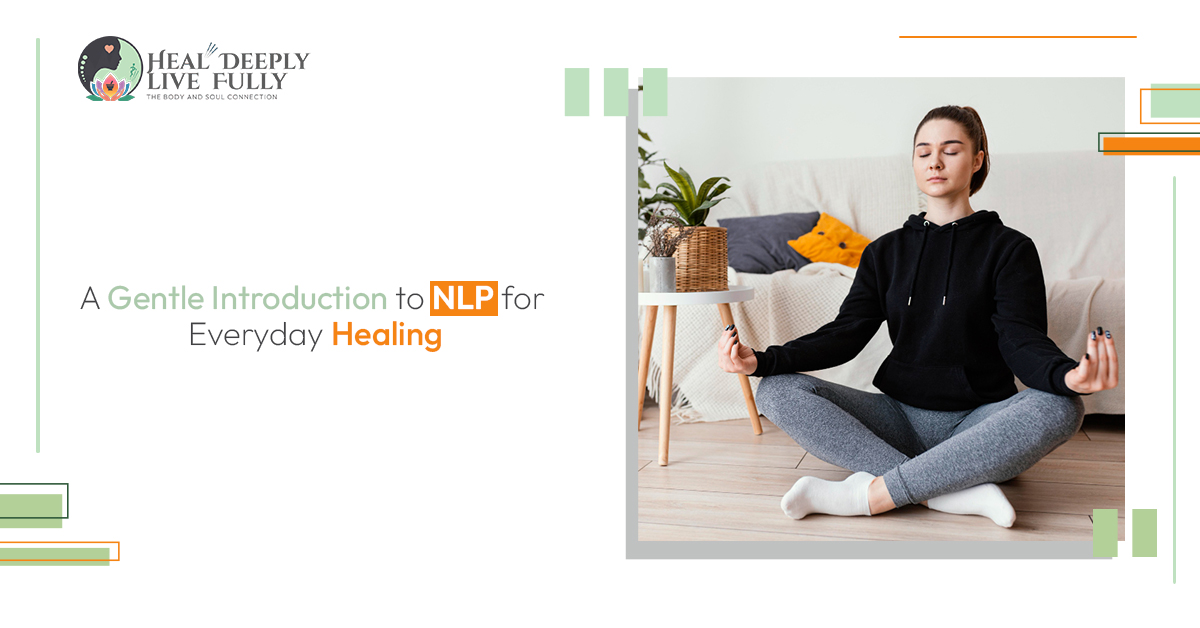The greatest change is sometimes seen in the least expected times.
It may be when you find yourself thinking more constructively about a long-time problem, or when you find your body relaxing in a situation that once caused tension.
This is the magic of Neuro-Linguistic Programming or NLP in play.
And in case you were wondering what NLP is and whether you should begin, this is the right place to be.
Think of this as a warm conversation about how this fascinating method can support your healing and especially when it’s combined with the holistic care you deserve.
What Exactly Is NLP?
NLP might sound technical, but at its heart, it’s simple.
It has to do with learning how your brain reacts to things and how you can soften those patterns to feel happier and experience more in this life.
The approach looks at three areas:
- Neuro: The way your nervous system works.
- Linguistic: The lingo (verbal and internal) that forms your reality.
- Programming: The acquired behaviors and reactions that shape the day-to-day lives.
Why NLP Feels So Natural for Healing
The most interesting feature about NLP is that it complements other healing modalities as naturally as possible.
At Heal Deeply Live Fully, we know that being well means considering the mind, body and spirit as one.
NLP can be used to assist you in situations where you are going through trauma, anxiety, or a life transition:
- Reframe challenging experiences in empowering ways
- Get rid of beliefs that are not productive
- Create more healthy communication patterns with others and yourself
- Tap into your inner resources to be resilient and grow
Consider NLP as a second language. The language of your mind.
Simple NLP Techniques You Can Try Today
The NLP is the beauty in its accessibility. The following are some of the gentle methods you can start practicing immediately:
- Anchoring. When you feel relaxed and grounded, press your thumb and forefinger together and take 3 deep breaths. Do this often when you are feeling well. Then, when you are stressed, remember that feeling of calm by applying this same light pressure!
- Reframing. Instead of asking, “Why does this always happen to me?” try to ask, “What can this situation teach me?” This slight change will open your mind to possibilities instead of stagnating in frustration.
- Visualization. Before difficult situations, take a couple of minutes to visualize yourself gracefully and confidently when dealing with them. Mental images come alive in your nervous system almost like a real experience.
A Compassionate Team
At Heal Deeply Live Fully, we are grounded in our NLP practices based on compassion and collaboration.
Our NLP specialist partners closely with our full range of providers, including specialists in:
- Acupuncture
- Chiropractic care
- Massage therapy
- Nutrition counseling
This means your NLP work doesn’t happen in isolation! Rather, it is incorporated into a holistic healing process with one modality complementing the others.
Your Next Steps
The process of healing does not necessarily have to be demanding and complex.
In some cases, it starts by just having the interest to see what is possible, such as wanting to know how NLP can help you on your own journey.
At Heal Deeply Live Fully, we would happily guide you with personalized care that respects your entire being.
We’d love to connect with you. Contact us today to schedule your consultation.
FAQs
What is the introduction of NLP?
The NLP (Neuro-Linguistic Programming) is a technique that examines how your brain processes experiences, and how you can change the thought and behavioral patterns subtly to improve your emotional well-being and personal development.
What are the 5 steps of NLP?
The five core steps are:
- Establishing rapport with yourself and others
- Setting clear, positive outcomes
- Looking and realizing your current patterns
- Implementing new ways
- Integrating some meaningful changes into your everyday life
Can I teach myself NLP?
Though you can learn the principles of simple NLP yourself but a trained practitioner can provide you with a personal approach and will ensure you are safe and effective in the implementation! Especially when it comes to dealing with trauma or ingrained patterns.
What are the 7 levels of NLP?
The seven levels are:
- Environment
- Behavior
- Capabilities
- Values/Beliefs
- Identity
- Purpose
- Spiritual connection
These levels help understand how change occurs from surface behaviors to deeper core beliefs and identity.

